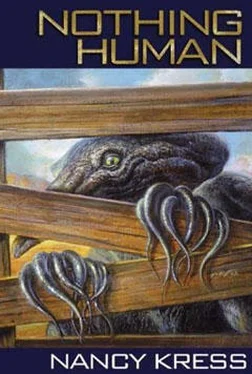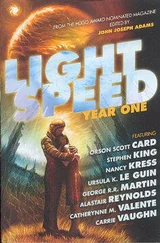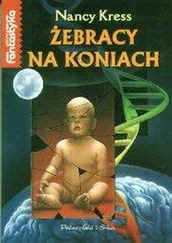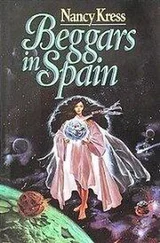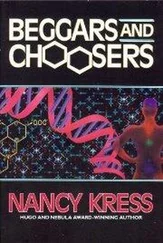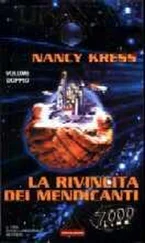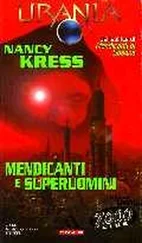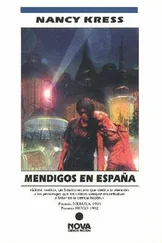“I’m not a biologist,” Rafe said. “Just an observer. The pribir can learn how we behave, even if they can’t anticipate it. They built in their secret protective weapon in the little mutants’ pheromones.”
“Don’t call them that,” Lillie said sharply.
Rafe grinned at her ruefully. “Even when you’re not smelling them, you can’t see them clearly, can you. Well, you’re their mother. I guess Pam and Pete couldn’t risk you going to the latrine and just deciding to never return. Lillie… do yourself a favor. Don’t ever be alone until Pam and Pete leave next week.”
She started in surprise. “You mean you think the pribir might—”
“They want as many of these… offspring as they can get. They could easily impregnate you again.”
Lillie considered. “No. It’s too soon. They know I’m nursing three kids. The strain on my body would be too great. It would endanger both sets of kids.”
Rafe looked unconvinced. He stood, gazing down at her. Abruptly he said, “You’re very brave.”
She said nothing.
“But, then, you always were. Even on the Flyer. Probably the bravest of all of us.” He turned and walked away very fast.
Lillie went inside. Sajelle sat holding one of the infants, crooning to it affectionately. Carolina changed another’s diaper. The third lay on Scott’s lab table, her gold-flecked gray eyes fastened on his face. Julie fussed with baby clothes. The room was very crowded.
Scott, delighted, said, “She’s smiling at me with her eyes!”
Lillie had been holding her breath, trying to assess her children objectively. Squat, gray-green, scaled hybrids…
“Scott,” she said, not exhaling, “Did Pam use reptile genes along with human ones? Did she?”
Scott looked startled. “Why, yes, she did. Does it matter?”
Lillie couldn’t hold her breath any longer. She let it out and gulped air, and with the air came the sweet baby smell.
“No,” she said, “it doesn’t.”
Sajelle said, “Have you decided yet what to name them?”
“The boy is Dionysus. The girls are Rhea and Gaia. You’re holding Gaia.”
“I never heard of names like that,” Sajelle complained. “What kind of names are those?”
“Very old ones,” Lillie said. “Scott, what have you learned about their genome?”
“Not a whole lot,” Scott said. “Four billion base pairs, a third more than we’ve got. I can only identify about twenty percent. Less than I can identify for your first lot of kids, Cord and Keith and Kella. We never even found out what all their genes can do, let alone this lots’. There’s just no match in the database. Maybe I’ll learn more over time. Here, take Rhea. I have to sit down.”
He eased himself into a chair. Lately Scott’s right knee had been bothering him. His hair was almost gone now, his face deeply lined. “Lillie, there’s been some shifts about your move. Lupe and Juan aren’t going.”
Well, that wasn’t unexpected. Neither Lupe nor Juan had builtin olfactory engineering. They never perceived the pheromones the babies sent out, and so their ridiculous prejudices must always be operating. The same was true for Martin and for Carolina, but Carolina was here anyway, calling Rhea “little cousin.” Evidently some people were naturally nurturing no matter what.
Scott continued. “Roy and Felicity also decided to stay here.”
Roy. The men weren’t around the babies as much as were the women, all with babies of their own. Roy may have persuaded Felicity to not go. Felicity was Julie’s daughter, did that mean —
“Spring and I aren’t going, either,” Julie said. She looked near tears. “I’m sorry, Lillie. But my own kids—”
“I understand,” Lillie said. Julie’s older children, Dakota and Felicity, and her six grandchildren would be here. Julie wanted to be near them.
“But,” Scott said, “Keith and Loni are still going. So is Alex. And also Cord, Clari, and the baby.”
Gladness flooded through her. Cord. “Did Clari—”
“I think it was actually her idea.”
“I’m glad I’ll have one of Tess’s grandchildren along.”
“You’ll be fine,” Scott said, wiping his forehead. He felt the ever increasing heat more than anyone except Robin. “As far as Rafe can tell over the Net, there’s nobody left in a hundred square miles of where you’ll be.
“And one more thing. I’m going, too.”
“You?”
“Don’t look at me like that. You neither, Sajelle and Julie. I know I look like an old wreck to you, but I’ll be better off at a higher, cooler elevation than I am here. And somebody should document as much as possible of the gene expression of Homo sapiens novus.”
Why? Lillie thought. Her children were not going to be building sequencers and analyzers any time soon. When they did, the design and data would be all different. She didn’t say this; she was too glad Scott was going with her. He was one of the few who could remember the world she had grown up in. One who could share those memories, that vanished life.
“I’m happy you’re coming, Scott.”
He said, “Emily can handle medical needs here.”
Sajelle said, “And all the rest of us will visit often, Lillie, and you can visit here. We don’t want to lose track of you, or these precious babies.” She gazed fondly at the infant in her arms.
Scott and Lillie looked at each other, and he made a complicated gesture not even Lillie could read.
The pribir ship lifted off in the middle of the night. No one heard it go. When Lillie came out of Scott’s lab in the morning, a knot of people stood behind the big house where the ship had been.
Lillie wasn’t really surprised. The last time, Pam and Pete had just ceremoniously dumped the humans in the desert, hardly saying goodbye. Farewell speeches apparently weren’t genetic.
She walked up to the group. A few people drew back, Sam and Senni and Kezia and, most hurtfully, Kella. Kella wouldn’t meet her mother’s eyes.
Lillie said, “Where’s Jody?”
“Inside,” Gavin said. “Do you want me to get him?”
They didn’t want her to go inside the big house, even though she wasn’t carrying any of the babies. A strange pain slid through her. “Yes. Get him.”
Jody came out, a few minutes after the others had left. He looked embarrassed but stubborn. The look suddenly reminded Lillie of a very young Tess.
“Jody, I want to leave for the mountains tomorrow, not in a few weeks. There’s no reason to wait. The children and I are more than strong enough to travel — ” thanks to the pribir ” — and I think we should go.”
He looked relieved, and that, too, sent a pain through Lillie. He said, “Okay. Tomorrow is good. Can you be ready at four? I want to get there before the heat of the day.”
There and back, he meant. But she only nodded. “We’ll be ready. Send out Cord and Keith.”
It was a caravan, the next morning, peculiar but probably no more peculiar than other caravans that had crossed this desert. Covered wagons, prospectors on mules, oil-seeking geologists, nuclear-waste trucks. Lillie had spent last evening using the old computer they were taking with them, seeking information on the site of her new home. She’d been shocked to see how little was left to access. Most sites had just ceased. The electricity had gone, the batteries had gone, the people had gone. How had the big libraries continued, with no one running them? Maybe someone was running them. Or maybe the machines were self-running by now, providing data and services endlessly for users who no longer existed. Lillie could have asked Rafe, but she knew she wouldn’t.
Jody drove DeWayne’s truck, still in good condition. In the ample truck bed, under tarps, rode Lillie, Alex, and Scott, each holding one of Lillie’s triplets. Keith and Loni’s three ten-month-old children were, miraculously, all asleep. Clari sat close beside Cord, holding baby Raindrop. Keith’s children were named Vervain, Stone, and Lonette. Cord and Clari, Keith and Loni had spent their whole lives on the isolated New Mexico farm. Conventional names meant little to them, mostly associated with silly Net shows. They named their kids after things that mattered to them. And, Lillie thought, “Gaia,” “Rhea,” and “Dion” were hardly more conventional.
Читать дальше
